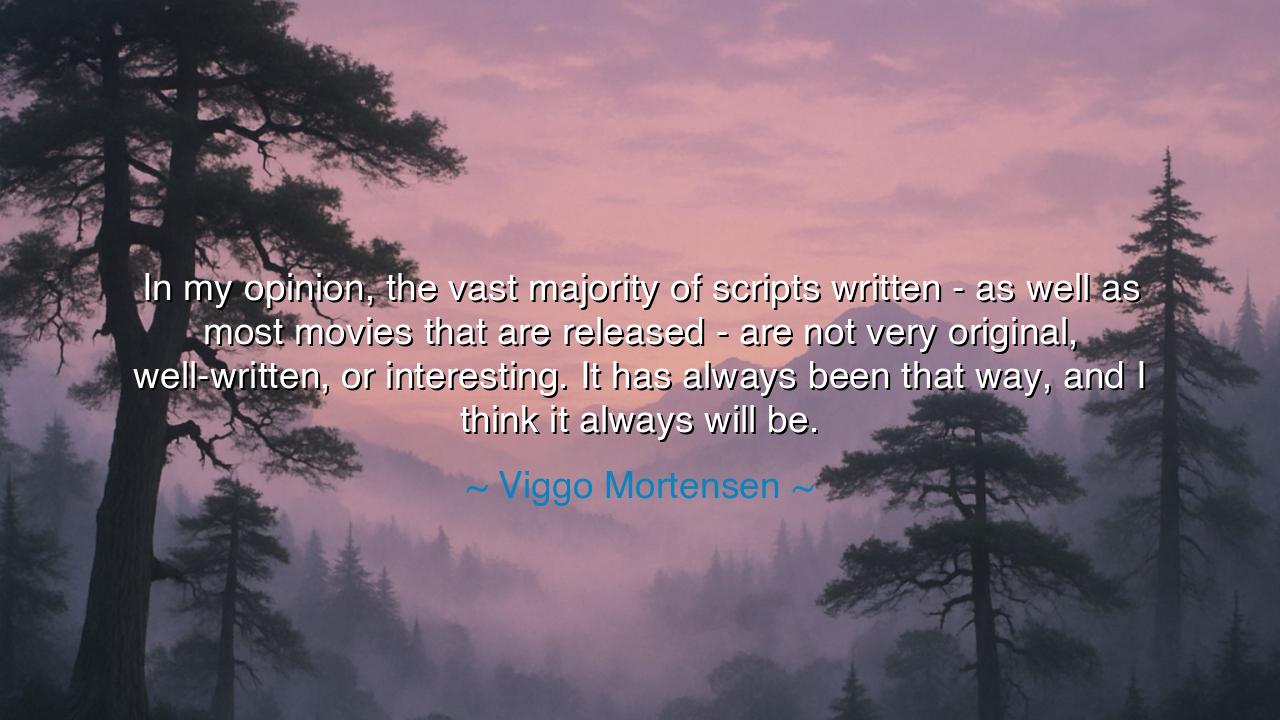
In my opinion, the vast majority of scripts written - as well as
In my opinion, the vast majority of scripts written - as well as most movies that are released - are not very original, well-written, or interesting. It has always been that way, and I think it always will be.






Listen now, O seekers of wisdom, to the words of Viggo Mortensen, a man whose journey through the world of cinema has been both deep and searching. He said, "In my opinion, the vast majority of scripts written - as well as most movies that are released - are not very original, well-written, or interesting. It has always been that way, and I think it always will be." These words, though spoken from the heart of one who has devoted his life to the art of acting, carry with them a truth that transcends the world of cinema. Mortensen's reflections echo through the halls of history, for they speak to a deeper issue: the struggle for authenticity, creativity, and originality in a world that often favors the comfortable and the familiar over the daring and the new.
To understand this, we must first consider the nature of art and creation. Throughout history, the greatest works have often been those that shocked the world, those that broke free from the chains of convention and explored uncharted territory. Shakespeare’s plays, which defied the rigid structures of his time, did not merely entertain—they forced the audience to confront the truths of human nature. His works, though rooted in the traditions of the theater, were original, daring, and everlasting because they dared to look beyond the expected. The greatest artists—whether in theater, literature, or film—are those who see the world with new eyes, those who challenge the status quo and offer something fresh, even when the world is content with repetition and imitation.
Mortensen’s words, however, reveal a sad reality—that in many fields of art, including cinema, there is a tendency to fall back on what is familiar. The scriptwriters and filmmakers, in their quest for success and commercial viability, often turn to formulas, to tired tropes and predictable narratives, instead of reaching for something bold, unconventional, and transformative. The modern age, with its obsession with profit, too often sacrifices true artistry for something easier, something that fits neatly into the mold that audiences expect. This is not new, as Mortensen suggests. Even in the days of the ancient Greek tragedies, playwrights sometimes turned to well-worn stories and mythologies, rather than crafting wholly new tales. Yet the greatest works, the ones that have endured, have always been those that broke free from these limitations, just as the modern artist must.
Consider the works of Vincent van Gogh, whose paintings were dismissed by many during his lifetime for their unorthodox style and use of color. Van Gogh’s originality was not accepted in his time, and yet, he created art that would transcend centuries, speaking to the hearts of countless generations. His unique vision did not conform to the expectations of his time, but it is his work that is now celebrated, revered, and recognized as some of the most innovative art in history. In the same way, the true artist must be willing to stand alone, to risk rejection, and to challenge the norms in order to create something that is truly original and enduring.
Mortensen’s lament also speaks to the difficulty of finding authenticity in a world that values convenience over creativity. Films, like all forms of art, are subject to the pressures of mass appeal. Yet, there is an undeniable beauty in the effort to create something that speaks not to the lowest common denominator, but to the soul. Consider the story of Orson Welles and his film Citizen Kane. Welles, a visionary director and actor, took risks in creating a film that shattered the conventions of cinema at the time. Citizen Kane did not follow the predictable narrative of other films, nor did it conform to the tastes of its audience. Instead, it challenged them, pushed boundaries, and created something that would forever change the landscape of filmmaking. Welles’ willingness to go against the grain in pursuit of his vision was not about following a formula—it was about creating something that was original, bold, and innovative.
In our own lives, we must take Mortensen’s words to heart. Success—in any field—does not lie in following the path of least resistance, in doing what is expected, or in creating what others want us to create. True greatness is found in the originality of thought and action, in the courage to challenge the status quo, and in the willingness to create from the depths of our own soul, not from the surface of what is popular or easy. Whether in art, business, or personal growth, we must dare to think and act differently, to take the road less traveled, and to break free from the limitations of conformity.
So, O children of the future, heed this lesson: The world will always try to keep you in line, to tell you what to do and how to think. But true art and true success come from within. Be bold in your pursuit of originality. Don’t be content with the familiar, the comfortable, or the expected. Strive instead for the new, the untraveled, and the unseen, knowing that it is in these places that true greatness is found. Like the great artists before you, dare to create something that is truly yours, something that speaks to the deepest part of your soul and reflects your most authentic vision. Only then will you create something lasting, something that will speak to generations to come.






AAdministratorAdministrator
Welcome, honored guests. Please leave a comment, we will respond soon